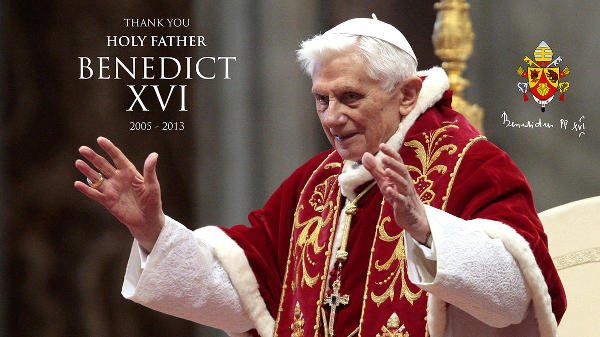
16. april (påskedag) fyller pave (emeritus) Benedikt 90 år – jeg gratulerer ham med dagen litt på forskudd.
I en artikkel på the Catholic Herald, med overskrift The Ratzinger revolution, og ingress His writings will one day inspire a generation to revolt against the West’s secular consensus kan vi lese bl.a.:
Benedict XVI will celebrate his 90th birthday on Easter Sunday. Cardinal Joachim Meisner famously described him as a man who is as intelligent as 12 professors and as pious as a child making his First Communion.
If one inserts the words “Joseph Ratzinger” into the Google Scholar search engine, which records academic publications, one obtains some 24,600 hits in four seconds. The words “Benedict XVI” bring up even more results – 66,100. ….
As Bavaria’s most famous son since Ludwig II enters his 10th decade of life, it is worth considering what the impact of all these publications might be in the brave new world of 21st-century Catholicism. My thought is that the publications of Ratzinger will form a treasury to be mined by future generations trying to piece together elements of a fragmented Christian culture.
Ratzinger himself emphasises that the seat of all faith is the memoria Ecclesiae: the memory of the Church. He believes that “there can be a waxing or waning, a forgetting or remembering, but no recasting of truth in time”. As a result, “the decisive question for today is whether that memory can continue to exist through which the Church becomes Christ and without which she sinks into nothingness”.
In this void of nothingness, in a world without the memoria Ecclesiae, the human person strives for an autonomy that is in conflict with his nature. It is natural, normal and healthy for one’s sense of self to exist within the context of a living history and tradition. Those without such moorings often spend their entire youth trying to “find themselves” without much success and often only after years of painful experimentation.
These reflections on the importance of memory were made by Ratzinger in 1982. Earlier, in 1958, during his theological teenager phase, Ratzinger wrote an essay entitled “The New Pagans and the Church”. In it he observed that whenever people make a new acquaintance they can assume with some certainty that the person has a baptismal certificate, but not that he has a Christian frame of mind. This was a full decade before the cultural revolution of the 1960s. …
…. When a new generation arises in full rebellion from the social experiments of the contemporary era, craving a human ecology that respects both God and nature, and wanting to be something more than rootless cosmopolitans, Ratzinger’s publications will serve as Harry Potter-style Portkeys, giving creative young rebels access to the missing cultural capital – indeed, access to what Ratzinger calls the memoria Ecclesiae.
High on the list of the missing cultural capital is the realisation that from the earliest times Christianity has understood itself as the religion of the Logos, the religion according to reason. As Ratzinger expresses the principle: “Faith has the right to be missionary only if it transcends all traditions and constitutes an appeal to reason and an orientation towards the truth itself.” The lack of truth, he argues, is the major disease of our age.
….
Både engelsk Wikipedia og norsk Wikipedia har grundige artikler om pave Benedikt.
